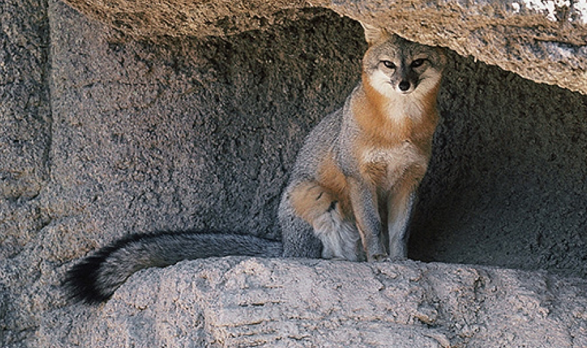Guest Column: Keeping raccoons, skunks and foxes from making your home their home
Published 9:00 pm Wednesday, March 13, 2024

- Gray fox.
Are you worried about raccoons, skunks, and foxes nesting on your property this season? Luckily, there are safe and humane ways to deal with wildlife conflicts like this. Taking the proper precautions will lead to better outcomes for you, your property, and the wildlife involved. Think Wild offers humane wildlife services including onsite consultations and humane exclusion to help resolve and prevent wildlife conflicts.
Raccoons, skunks, and foxes nest in dens in the spring between March and August. These animals will often repurpose holes dug by other animals for their dens, but occasionally stumble upon more urban environments such as below a deck or crawl space to build their den. While these animals are just looking for safe places to build their nests, it is not ideal to have a raccoon, fox, or skunk family as close neighbors! While uncommon, they can carry and transfer rabies as they are all rabies vector species.
Trending
Raccoons, skunks, and foxes choose nest sites that can provide shelter and safety. To prevent them from nesting on your property, it is most effective to add exclusion fencing and cover up holes and spaces where they might enter and den. Hardware cloth is inexpensive wire mesh that can be installed to cover vents and other openings that animals may enter. Closing up potential denning sites is the best way to prevent unwanted neighbors, but there are some other ways you can discourage wildlife from nesting on your property.
Food is one of the biggest attractants for wildlife. Leaving pet food out gives wildlife a steady food source and will likely encourage them to keep coming back. Your property will become less attractive to these animals when you secure your garbage can lid, keep garbage cans in a secure indoor location, and avoid leaving pet food out, especially overnight. To prevent predatory mammals from preying on chickens on your property, keep them in a locked coop at night. Ensure that your coop wiring goes at least a foot below ground or have it bend at 90 degrees to create an apron going out away from the structure. You can also play a radio and use motion sensor lights to deter wildlife from approaching. Another suggestion to avoid conflict between wildlife and pets is to secure water sources that are close to your home where pets or livestock are present.
If you suspect there is a predatory mammal nesting on your property already, track their movements by sprinkling flour on the ground near suspected denning sites and look for tracks. If an animal does successfully nest near your home, and they’ve already had their young, please be patient and allow the family to leave on their own. They will usually leave after about eight weeks. If you close up their access point, it’s crucial to make sure there are no babies left in the den. Mothers will do just about anything to get back to their babies and you might end up with more damage.
Once the animals have moved on, you can follow the exclusion suggestions above to prevent animals from choosing that nest site in the future. You can also hire Think Wild to provide site assessments and exclusion installations for you. Hiring a professional to help with exclusion will increase the likelihood of success.
Relocating wildlife is never something we suggest as it is ineffective and often harmful to the animal. If possible, the best option is to take preventative measures so these animals don’t even consider your property as their nesting grounds.
If you want support with humane wildlife exclusion, or suspect there may already be wildlife nesting on your property, please reach out to our wildlife services coordinator at wildlifeservices@thinkwildco.org for help! Our humane wildlife solutions are cost-effective, long-term solutions that improve outcomes for humans and wildlife alike.
Trending
Do you have a point you’d like to make or an issue you feel strongly about? Submit a letter to the editor or a guest column.








